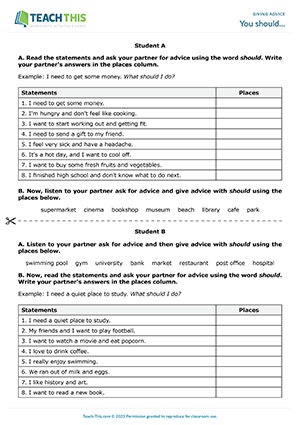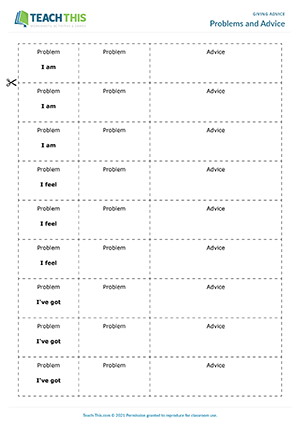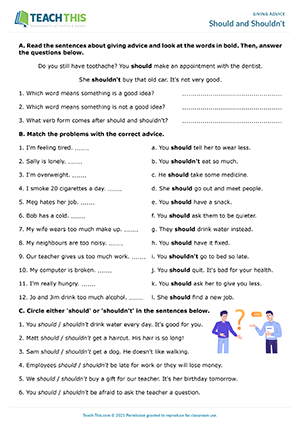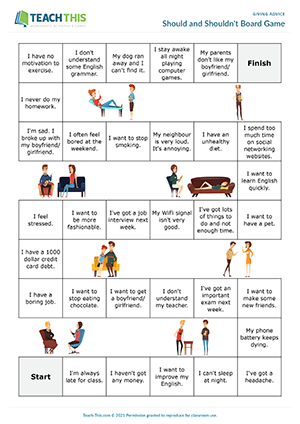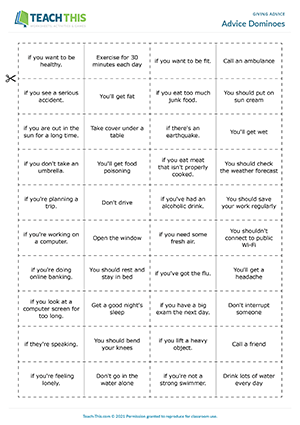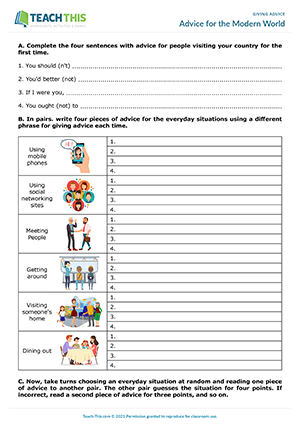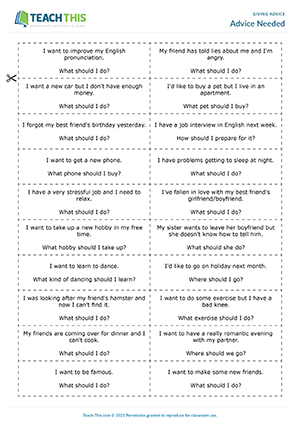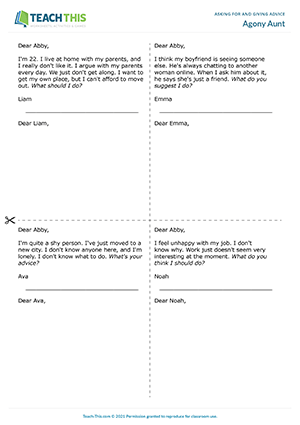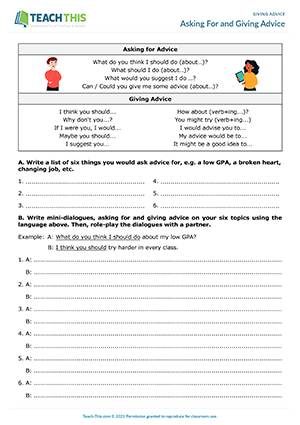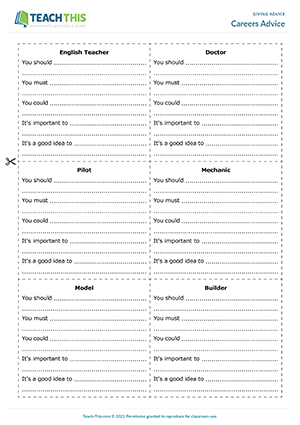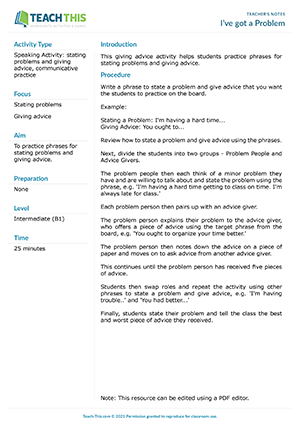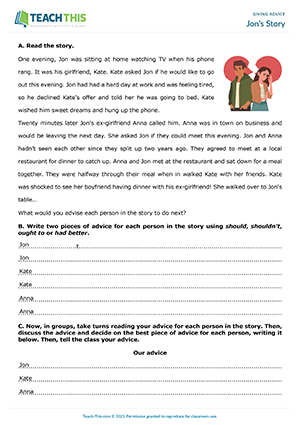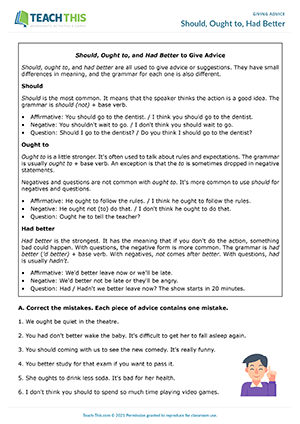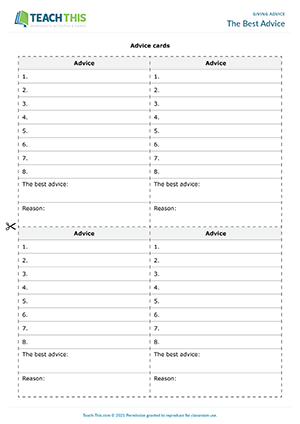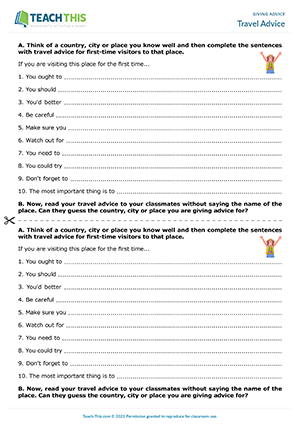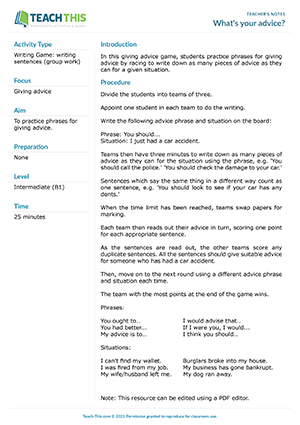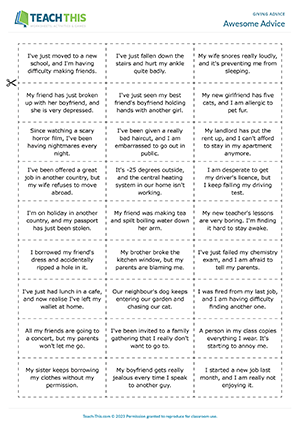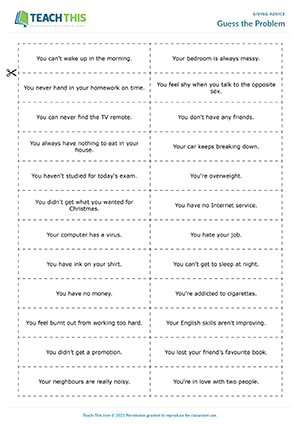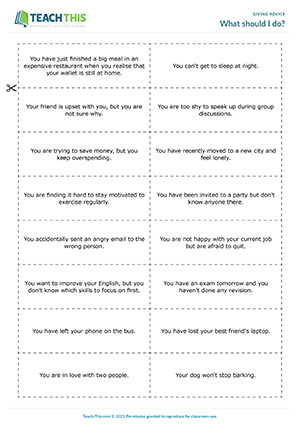Here is a productive giving advice speaking activity to introduce students to using should to ask for and give advice. In pairs, Student A begins by reading each statement and asking their partner for advice using the word should, e.g. 'I need to get some money. What should I do?' Student B listens and then gives advice with should using the places shown on their worksheet, e.g. 'You should go to the bank.' Student A then writes the place next to the statement. When the students have finished, they swap roles and repeat the activity. Afterwards, go through the answers with the class by reading the statements and eliciting the advice.
In this useful stating problems and giving advice game, students complete cards with problems and advice and then use the cards to play a game where they match the problems and advice together. Students begin by writing sentences that state problems and give advice. Students then cut the sentences into problem cards (2 parts) and advice cards. One student begins by putting down a card showing the first half of a problem. The next student must complete the problem using one of their cards. The following student must then put down a card showing a matching piece of advice for the problem. If the student manages to do this, they keep the three cards and put down the first half of a new problem. If a student cannot put down a suitable card at any time, the student picks one up from the appropriate pile and it's the next student's turn to put down a card. The player with the most cards at the end of the game wins.
Here is a comprehensive should and shoudn't worksheet to help students learn and practice giving advice with should and shouldn't. Students begin by reading sentences about giving advice and answering three questions. Students then match problems with the correct advice. Next, students circle should or shouldn't in a set of sentences. After that, students move on to complete sentences with should or shouldn't. In pairs, students then read problems and write some advice in response to each one using should or shouldn't. Finally, students write down two problems of their own, ending with the question What should I do? Students then read their problems to their partner who gives them advice using should or shouldn't.
In this fun giving advice board game, students read problems and give advice with should and shouldn't. Players take it in turns to roll the dice and move their counter along the board. When a player lands on a square, they read the problem and give a piece of advice, saying one thing the person should do and one thing they shouldn't do. The other students listen to the advice and judge the player's response. If it's grammatically correct and appropriate, the player stays on the square. If not, the player goes back two squares. The first player to reach the finish wins the game. If you have a weak class, you can have students play by giving one piece of advice with should or shouldn't. The game can also be played with other phrases for giving advice.
In this enjoyable giving advice with conditionals game, students play dominoes to practice the zero and first conditional for giving advice. The first player puts down one of their dominoes on either side of the domino on the table, making sure that the main and if clause go together to make a zero or first conditional sentence for giving advice. The other players then take it in turns to match their dominoes in the same way by putting them down at either end of the domino chain and making a suitable conditional sentence for giving advice. The first player to get rid of all their dominoes wins the game.
In this engaging everyday advice game, students write advice for modern-day situations and then play a guessing game using the advice. In pairs, students write four pieces of advice for the modern-day situations on the worksheet using a different structure for giving advice each time. Each pair then joins with another pair. One pair chooses a modern-day situation at random and reads one of their pieces of advice to the other pair who guesses which situation the advice is for. If the pair guesses correctly, they score four points. If they guess incorrectly, the pair reads a second piece of advice for three points and so on. When a pair guesses a situation successfully or all four pieces of advice have been read out, the pairs swap roles. This process continues until both pairs have given advice for all the situations. Pairs then play a second round where they take it in turns to read out all four pieces of advice for each situation. If a pair has a piece of advice that is different from the other pair, they score a point. The pair with the most points at the end of the game wins.
In this free should for advice game, students give the best advice they can using the modal verb should. Students take it in turns to pick up a card, read out the situation on the card and ask for advice. The other students then each give a different piece of advice for the situation using the modal verb should. The student with the card listens and awards the card to the person who gives the best advice. The student with the most cards at the end of the game wins. Afterwards, students tell the class the best advice they were given for each situation.
In this imaginative giving advice speaking activity, students take on the role of an agony aunt called Abby and give advice. First, students write a reply as Abby, giving advice for the problem on their card. Next, in groups, students read and discuss all the advice given by other students for their assigned problem. Each group then chooses the best advice and writes a final response. Afterwards, groups take it in turns to read their problem and advice to the class who say whether they agree with the advice or not.
Here is an insightful giving advice worksheet to help students learn how to ask for and give advice on everyday topics. First, students then write a list of six things that they would ask advice for, e.g. a low GPA, a broken heart, etc. Next, students write mini-dialogues, asking for and giving advice on their six topics. Students then role-play the dialogues with a partner. After that, students imagine that they run an online advice column. Students read three emails asking for advice and write replies, giving the best advice they can. Finally, students read out their replies and the other students say whether they agree with the advice or not.
In this rewarding giving advice game, students give careers advice and their classmates try to guess the matching jobs. In pairs, students complete each job card with career advice for someone who would want to do that job in the future. When the pairs have finished, they take it in turns to read out the advice on one of their job cards, without saying what the job is. The other pair listens and tries to guess which job they are giving career advice for. If the pair correctly guesses the job, they score a point and keep the card. If not, the pair reading out the advice scores a point and keeps the card. The pair with the most points at the end of the game wins.
This communicative giving advice speaking activity helps to teach students how to state problems and give advice with should, ought to and had better. Half the class are problem people and the other half are advice givers. The problem people think of a minor problem they have and are willing to talk about, e.g. 'I'm always late to class'. Next, each problem person pairs up with an advice giver and explains their problem to them. The advice giver then gives a piece of advice, e.g. 'You ought to organize your time better'. The problem person then moves on to ask advice from another advice giver. This continues until the problem person has received five pieces of advice. Students then swap roles and repeat the activity. Afterwards, students state their problem and tell the class the best and worst piece of advice they received.
In this interesting giving advice speaking activity, students read a short story and then write advice for the people in the story. First, students read the short story on the worksheet together as a class. Students then write two pieces of advice for each person in the story using should, shouldn't, ought to or had better. Next, in groups, students take it in turns to read their advice to the group. The group members discuss the advice and try to come up with one piece of sound advice for each person. Afterwards, groups report back to the class on the advice they came up with.
Here is a handy giving advice worksheet to help students learn and practice how to give advice using should, ought to, and had better. Students start by finding and correcting mistakes in pieces of advice. Next, students unscramble words to make advice and then match the advice with problems. Finally, students read a set of problems and choose a suitable piece of advice for each one from a box and write a sentence with it using should, ought to, or had better.
In this communicative stating problems and giving advice speaking activity, students ask for and give advice and then choose the best piece of advice they received. In pairs, students ask their partner for advice about the problem on their card and write down the advice they receive. Students then pair up with a new partner and repeat the process until they have spoken to eight people. Next, students choose the best piece of advice and write on their card why they think it's the best. Afterwards, students tell the class about their problem and the best advice they received.
In this creative giving travel advice game, students write travel advice for a place they know well and then use the advice in a guessing game. To start, students think of a country, city or place they know well. Students write the name of the place in the space provided and then complete sentences with travel advice for first-time visitors. Students can give advice on things like climate, public transport, customs, taxis, crime, shopping, food and drink, etc. In groups, students then take it in turns to read their travel advice to the group, without saying the name of the place. The other students in the group listen and guess which country, city or place the student is giving advice for. Afterwards, groups choose one student from their group to read their travel advice to the class who try to guess the place.
In this free giving advice game, teams have five minutes to write down as many pieces of advice as they can for a given situation, scoring points for each appropriate sentence. In each round, give students a different structure for giving advice to use, e.g. 'You should...' Write a situation on the board, e.g. 'I just had a car accident'. Teams then have five minutes to write down as many pieces of advice as they can for the situation using the structure, e.g. 'You should call the police'. Teams score one point for each appropriate piece of advice. Play further rounds using a different situation and structure for giving advice each time. The team with the most points at the end of the game wins.
In this fast-paced giving advice game, students race to give advice for different problems using modals of advice and the second conditional. In groups, students take turns picking up an advice card and a problem card, reading the advice prompts and problem to the group, and placing the two cards face-up on the table. As soon as the cards are on the table, all the students race to come up with advice for the problem using the two prompts on the advice card. When a student thinks they can make two suitable sentences, they put their hand up and give their advice. If the other students agree that the two pieces of advice are grammatically correct and match the problem, the student wins and keeps the two cards. If the advice is grammatically incorrect or doesn't match the problem, or the student fails to put up their hand before speaking, they are out of the round, and the other students continue trying to come up with advice. The student with the most pairs of cards at the end of the game is the winner.
In this entertaining giving advice game, students offer advice and their classmates try to guess what the problem is. Students take it in turns to pick up a card, read the problem on the card and start giving advice for the problem. The other students listen and try to guess what the problem is. The first student to state the problem wins and keeps the card. If no one manages to guess the problem after lots of advice has been given, the student giving the advice keeps the card. The student with the most cards at the end of the game wins.
In this amusing giving advice game, students try to give the best advice they can for a variety of problems. Students take it in turns to pick up a card, read out the problem on the card to the group, and ask 'What should I do?' The other students listen and then each give some advice in turn. The reader listens and awards the card to the person who they think has given the best advice. The student with the most cards at the end of the game wins. When everyone has finished, students report back to the class on the best or worst piece of advice they received for each problem.
Latest Free
Resources
- Everyday Objects Bingo
Everyday Objects
Elementary (A1-A2)
- Action Verb Races
Actions
Elementary (A1-A2)
- Birthday Basics
Birthdays
Elementary (A1-A2)
- Sales Phrasal Verbs
Business Phrasal Verbs
Upper-intermediate (B2)
Latest Member
Resources
- Collocations at Work
Business Collocations
Intermediate (B1)
- Etiquette Trivia Board Game
Etiquette and Manners
Upper-intermediate (B2)
- Everyday Objects Vocabulary
Everyday Objects
Pre-intermediate (A2)
- Let's have a talk
Verb-Noun Collocations
Pre-intermediate (A2)



